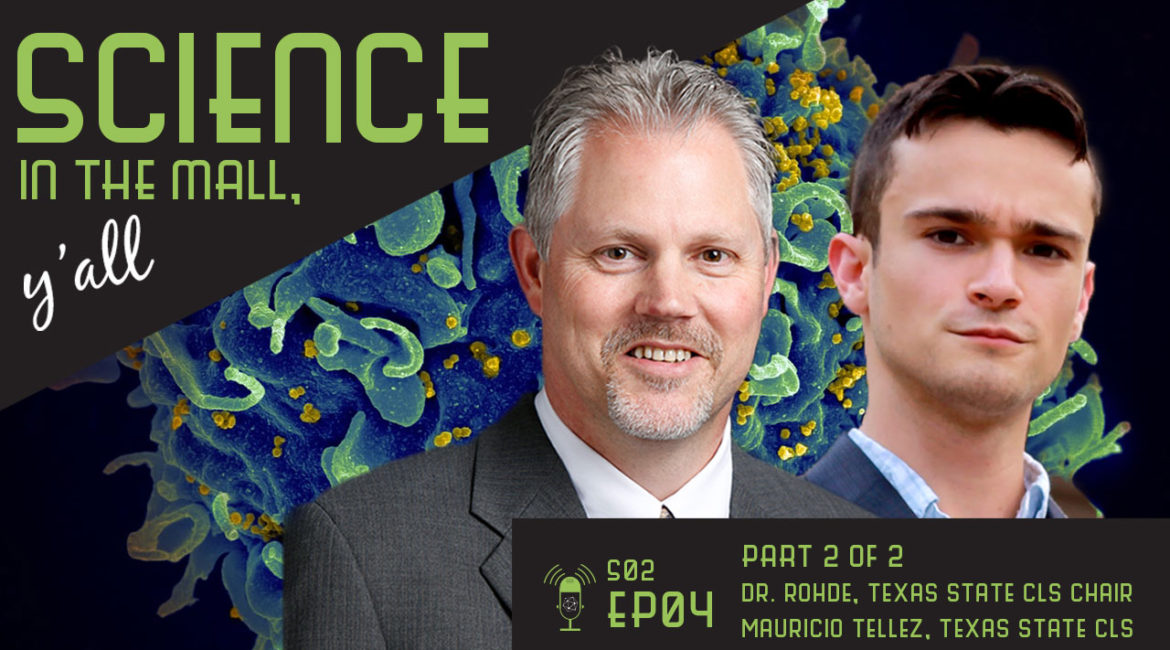[featured-video-plus width=770]



What you’ll hear in this episode:
- How the COVID-19 pandemic has affected the CLS field.
- Why more people should consider the CLS path, and what opportunities beyond an Associate’s or Bachelor’s degree.
- The ways that an internship at ABI prepares people for educational and career opportunities in unexpected ways.
- The importance of lab work to medical diagnostics and decisions.
- Why people interested in biosciences, but less so in bedside care, should consider alternate career avenues into the medical field.
Once upon a time, Mauricio Tellez was an intern at the ACC Bioscience Incubator lab. He spent his time there getting his hands on every piece of equipment he could, drawing from the multitude of learning opportunities ABI provides. Experiences which helped him get into, and excel in, the CLS program at Texas State University.
Now, he works as a Clinical Laboratory Scientist in a hospital, monitoring patients’ HIV, identifying leukemia lymphoma, and detecting hemoglobin mutations among other things. Helping patients while never having to take a temperature or administer medication.
So, how does one get from point A to point B?
By taking advantage of the opportunities in every situation.
And in the Biosciences, specifically in the field of Laboratory Science, opportunities abound.
When most people think of the medical profession, one of two career paths spring to mind — doctors and nurses. But the fact is, so much happens behind the scenes that enable doctors and nurses to do their job safely and effectively. In fact, the professionals who often have the greatest impact on patient diagnoses and care decisions are rarely seen by the people they help — the laboratory scientists.
Yet career and educational opportunities in this field are often overlooked by people interested in the biosciences, mostly because they aren’t even aware these opportunities exist.
But all that is changing. In the wake of the COVID-19 pandemic and the mad dash to develop, produce and distribute vaccines, lab scientists are in the spotlight more than ever. Dr. Rohde calls this a double-edged sword. “The pandemic has absolutely shone a light of visibility on our profession. But it’s also added stress and burnout.”
A boon of this increased awareness of the Clinical Laboratory Sciences also means there is a corresponding increase in the need for professionals in the field. And there are more career and educational opportunities than ever.
Opportunities which both the ABI and CLS program are working to prepare students for by providing exposure to instruments and processes, and giving students practical, hands-on experience which help them learn laboratory concepts such as QC (quality control). Mauricio credits this type of experience as what gave him a leg up on competition, both getting into the CLS program, but also landing his current position.
In part two of their conversation, Mauricio and Dr. Rohde discuss the details of life as a laboratory scientist, outline the importance of bringing your personality and unique skills to work, and give great advice for students looking to turn their passion for science into a fulfilling career.
Listen to the full episode to learn more about ACC’s Bioscience Incubator, Texas State’s CLS Program, and how wildly varied the possibilities are for people who are passionate about science and ready to learn.
Learn more about Texas State University’s CLS Program.
Learn more about Dr. Rohde.
Learn more about ACC Bioscience Incubator
If you liked the episode, don’t forget to like, subscribe, and share it with a friend!
Science In the Mall, Y’all is a founding_media podcast created in partnership with the ACC Bioscience Incubator.
Host: Dan Dillard, founding_media
Guests: Nancy Lyon, ACC Bioscience Incubator Director
Dr. Rodney E. Rodhe, CLS Program Director and TSU Professor
Mauricio Tellez, CLS Program Graduate




